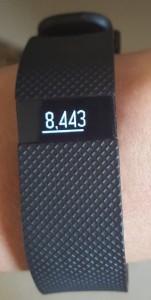How Accurate Is Your Fitness Tracker?
How Accurate Is Your Fitness Tracker?
 Recently one of my personal training clients came to me bragging about how he had walked over 35,000 steps in his regular work day and therefore didn’t need to do his cardio. I laughed and asked him if he even knew how those fitness trackers work? It tracks on the movement of your arm. Therefore, you can be washing dishes or changing a light bulb and it will be counting your arm movement as steps. According to a multiple studies, activity monitors may not be as accurate as you’d like them to be, with some of the most popular devices on the market getting it wrong at least 10 percent of the time.
Recently one of my personal training clients came to me bragging about how he had walked over 35,000 steps in his regular work day and therefore didn’t need to do his cardio. I laughed and asked him if he even knew how those fitness trackers work? It tracks on the movement of your arm. Therefore, you can be washing dishes or changing a light bulb and it will be counting your arm movement as steps. According to a multiple studies, activity monitors may not be as accurate as you’d like them to be, with some of the most popular devices on the market getting it wrong at least 10 percent of the time.
Overall Accuracy
The accuracy levels while resting are quite impressive. However, this is not the same when one is active.
Accuracy of the Heart Rate Measurement
Ones heart rate is measured by the expansion and contraction of blood vessels and their rhythm. LED lights on the tracker detect the changes in volume of blood being pumped. To get the heart rate, most fitness trackers use this simple formula – 220 subtract your age. This helps you to optimize on your exercise, bearing in mind the various intensities. This accuracy can be altered by many factors. The higher up your arm you place your tracker, the better the blood flow, thus it gives a more accurate reading. The wristband should not be too tight, as it will restrict the flow of blood leading to an inaccurate reading.
Reason for Extra Floor Readings
Most trackers count floors using an altimeter. This is an altitude sensor based on atmospheric pressure. Though the trackers are meant to measure change in pressure because of elevation, other reasons might cause a change in pressure like wind and opening of a door. This might cause the tracker accuracy to be distorted by adding a floor or two.
Reason for Extra Steps
When cooking, working at a desk, or other activities involving arm movements, trackers may think you are walking and can pick up extra steps.
Accuracy of Calories Burned
This is fairly accurate. Basal Metabolic Rate (BMR) is responsible for at least half the calories lost in a day. BMR is the rate at which the body burns calories during the normal functioning of the body like brain activity and breathing. BMR is measured according to weight, gender, height and age. If the tracker takes into account BMR when it is calculating lost calories.it may be a tad bit more accurate. The tracker also accounts for the calories lost because of the heart rate. At midnight, the tracker should automatically reset the calorie statistics and start over.
For more information on fitness trackers, how to burn fat, getting in shape, eating healthy, weight training, health and wellness, or if you’re frustrated with your current level of fitness and have been thinking about hiring a personal trainer, contact us.

